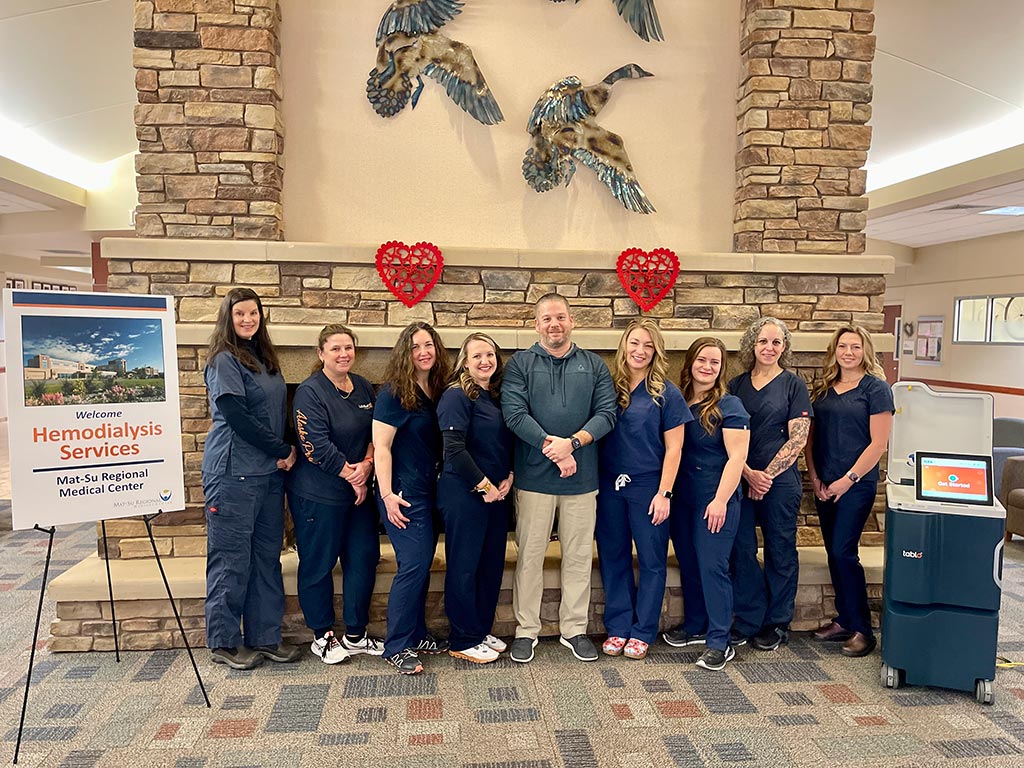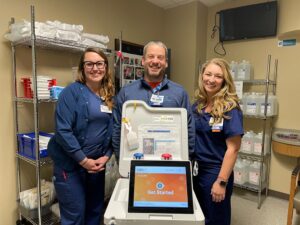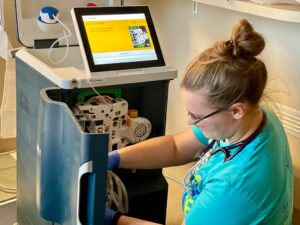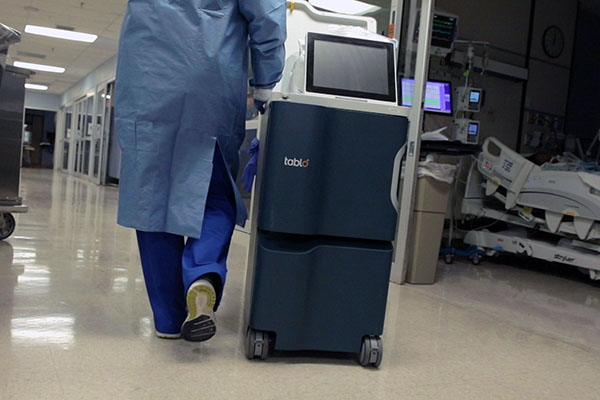Exceeding Dialysis Care Expectations in Rural Alaska

Summary
In the growing city of Palmer, Alaska, Mat-Su Regional Medical Center is impacting kidney patients, their families, staff and the hospital’s bottom line since introducing an ICU-to-bedside hemodialysis option.
The rugged Alaska wilderness presents unique challenges in meeting its population’s healthcare needs. For kidney disease patients requiring life-preserving hemodialysis and their families, this can mean long commutes on snowy, icy roads. In Palmer, located about 40 miles north of Anchorage in the Matanuska-Susitna (Mat-Su) Valley—the most rapidly growing area of the state—several converging factors led Mat-Su Regional Medical Center, serving patients over a vast 25,000-square-mile region, to expand its dialysis offering in 2022 to an efficient new acute model. A positive and unexpected impact on patients, their families, staff and the hospital’s bottom line has resulted.

The need for dialysis options at Mat-Su has grown in recent years due to a lack of kidney disease education and healthcare options in its rural community, and a high rate of end-stage kidney disease (ESKD; also known as end-stage renal disease, ESRD) risk factors such as diabetes and hypertension among Alaska Natives. Adding to this, COVID-19 hit the state hard and fast, and the demand for acute kidney injury (AKI) dialysis spiked. In 2021, the state reached out to the hospital to offer the Tablo® Hemodialysis System to help with their caseload, as part of a U.S. Department of Health and Human Services (HHS) emergency deployment of Outset Medical’s system for use in patients with acute and/or chronic renal failure.
Mat-Su had been offering renal replacement therapy in its ICU for years, but no intermittent hemodialysis (IHD). Even before COVID, the demand for IHD had been growing. Daniel Russell, RN, BSN, CCRN, CV Services and Hemodialysis Director at Mat-Su, says they had heard positive feedback about Tablo from another Alaska hospital that was bringing the machines in-house. Soon after the HHS-sponsored consoles arrived, they decided to commit to a permanent in-house IHD program.
“Hospital admissions growth had been over 400% over the past couple of years, so increasing our service line to be able to provide a range of dialysis care options to our community was the goal,” he says. “We were in a perfect situation to start with the machines from HHS so we could see how the program was going to go. We then decided right away to capitalize on that and purchase additional Tablo units, and hire and cross-train staff,” he adds. “Some patients were so sick that they had to be flown down to Anchorage rather than being taken by ambulance, so we also wanted to help decrease their healthcare costs.”
In February 2023, Mat-Su celebrated its one-year anniversary of providing flexible Tablo hemodialysis in the ICU and bedside, with its first treatment done on February 26, 2022. “From our program launch through the end of last year, we were able to treat 50 patients here in our hospital that in the past we would have had to accommodate at other facilities,” says Russell.
Staff Training and Supply Efficiencies
When Tablo consoles were brought in at Mat-Su, the team felt well-prepared for its staff training and go-live, based on advanced planning and onsite training with the Outset Medical team.

“Our nurses did their Outset University online training modules so they could hit the floor and do their in-person training, actually touching and taking care of a patient, which is huge,” says Mandy Bush, RN, BSN, Clinical Coordinator of Dialysis and Administrative House Supervisor. “With Outset’s help with our staff training, in using the machines hands-on and doing mock treatments, we were able to get staff on the floor and running treatments within a matter of a week. This is a huge difference from other machines I’ve used in the past that required months of training.”
“With Outset’s help with our staff training, in using the machines hands-on and doing mock treatments, we were able to get staff on the floor and running treatments within a matter of a week.” – Mandy Bush, RN, BSN

The Mat-Su team notes that its success over the past year would not have been possible without staff support. Both the IHD and ICU staff have been excited about bringing Tablo on as they are able to learn a new skill and provide a flexible treatment modality to patients, adds Alyssa Krier, RN, ICU clinical coordinator and one of the IHD staff. Due to program growth, the team is assessing the need for full-time IHD staff, as its IHD nurses currently have primary responsibilities in other departments across the hospital.
“Our staff and IHD nurses wanted to learn how to use Tablo, essentially taking on a second job on top of their first, and that really says a lot,” says Bush. “They love learning to provide this service. Having buy-in from your nurses makes a huge difference in making your program successful.”
They are currently training ICU staff to run sustained low efficiency dialysis (SLED) treatments with Tablo and relieve the dialysis nurses, so patient care will be provided by a combination of ICU and IHD teams.
“As critical care nurses, that’s what we love, that’s what we’re here for, so being able to bring this service in-house has definitely made an impact on our staff,” Bush continues.
The team enjoys the flexibility of SLED with Tablo, that facilitates earlier ambulation of patients and significant dialysis-free time. “The old machines are actually in storage, and we’re just using Tablo. Unstable patients are receiving SLED with Tablo, and we’ve had great success with it,” says Russell. “We can schedule MRIs or other procedures, and get patients out of bed and moving.”
They are currently training ICU staff to run SLED treatments with Tablo and relieve the dialysis nurses, so patient care will be provided by a combination of ICU and IHD teams.
He also emphasizes that the hospital’s lead nephrologist, Jeremy Gitomer, MD, couldn’t be happier with where the program is going. “Several other Anchorage area hospitals that he is affiliated with also have Tablo, so he has become pretty well versed with the machines. He’s progressive and looks at the whole picture, and the fact that we’ve gone from using two types of machines to one has increased efficiency, and decreased our stock, supply chain and storage issues. He’s really satisfied with how much our program has grown.”
Russell notes that the supplies with Tablo are minimal, which has decreased complexity and costs. “Previously, I would fill up a whole cart each day with bags and bags of dialysate and other supplies. It was very labor intensive. We had a huge storage room just for the many boxes that the dialysate and everything came in, versus a small storage area that I now have in our room (pictured in the background of the team photo above) where we can keep enough Tablo supplies to last us a week or so. Overall, Tablo takes up less space, it’s more efficient, we use fewer cartridges and it’s cheaper to run. All of that is a huge benefit for us. When we started we did a statistical analysis on what we would be saving, and it was going to be quite a bit.”
Unexpected Impact on Patient Care
The Mat-Su clinical staff agrees that the most significant and unexpected impact of bringing Tablo in-house has been on their dialysis patient care and experience, and they look forward to continuing to impact the lives of patients in the Mat-Su Valley.
Keeping patients in their own community has been hugely beneficial, says Krier. “Patients are able to discharge home or to an outpatient chair time with little transportation worry. If they were hospitalized in Anchorage, it would be quite a nightmare to get them discharged to a chair time out here where they live.”
The team didn’t expect the level of impact that bringing dialysis in-house with Tablo would have on patients’ families. “They were the first to express to us that this is amazing,” says Russell. “For years, their loved one has come here and then had to get transferred to Anchorage for their dialysis. It was great to see the effect it had on the families in being able to drive 10 minutes instead of up to two hours in bad weather. That was yet another huge positive that we didn’t foresee.”
“We have a purpose and ambition statement, which is we help people get well and live healthier, with a vision to exceed patient expectations, and this service line is certainly aligning with those goals as an organization,” he adds.
ABOUT MAT-SU REGIONAL MEDICAL CENTER
Mat-Su Regional Medical Center is a 125-bed healthcare facility providing advanced surgical service, including robotic-assisted partial and total knee and total hip replacement, cardiac care, emergency services, sleep studies, inpatient behavioral health, advanced wound care, three urgent care centers and the Family Birthing Center. Mat-Su Regional Medical Center is accredited as a Chest Pain Center by the American College of Cardiology, and as a Primary Stroke Center by The Joint Commission. The hospital has twice been named one of the Top 150 Places to Work in Healthcare by Becker’s Hospital Review.
The views and opinions expressed in this blog post represent the personal opinions of the facility staff. The content should not be taken as medical advice. Never ignore professional medical advice in seeking treatment because of content you have read on the Outset Medical website.

